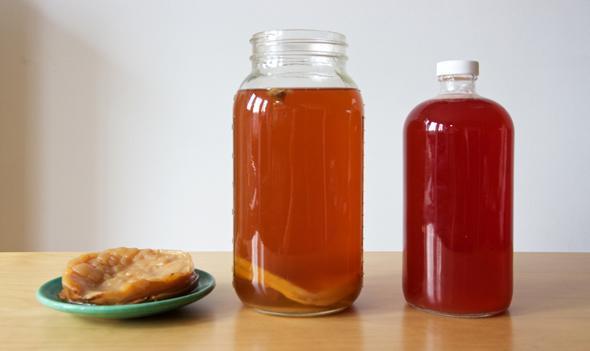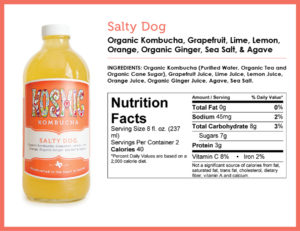Kombucha has been rising in popularity over recent years. As a dietitian, I’ve noticed more and more clients report that they regularly drink kombucha. Up until now, I’ve known little more than the basics, so I decided to dig deeper into the research to firm up my understanding and recommendation. Here’s the low down:
- What is Kombucha? A fermented tea made with black or green tea, sugar, bacteria and yeast.
- Why is it fermented? The fermentation process produces gut-friendly bacteria or probiotics, among other things, like vinegar and a small amount of alcohol (not enough to get a buzz on your lunch break).
- Health claims. Kombucha claims to aid digestion, improve sleep, promote weight loss, reduce the risk of heart disease, help manage blood sugar in diabetics, prevent cancer and enhance the immune system.
- Really? No. Unfortunately, the health claims kombucha have not been backed by clinical trials or sound scientific evidence. Most of the health claims come from personal reports from kombucha consumers and a few small animal studies.
- Bacteria – is it safe to drink? Commercially produced kombucha is generally regarded as safe, however, home-brewed kombucha can be easily contaminated if prepared in non-sterile conditions, resulting in unhealthy bacteria and therefore illness (nausea, upset stomach and has even been linked to one death!). Pregnant women and those with a weakened immune system should probably avoid the stuff; not worth the potential risk of contamination!
- Nutrition facts. Your average kombucha has 30-50 calories and 7-13 grams of sugar per 8 ounce serving.
- How does it stack up to other drinks? Well, it definitely has more sugar and calories than water. But, it does have less calories and sugar than most other bottled teas, which have 75-100 calories per 8oz serving and a typical soda has 100 calories per 8oz serving.
- Brand loyalty. I did some “consumer research” by asking friends and clients. Most people have a favorite brand. Highlights included GTs, Kosmic Kombucha and Buddha’s Brew.
- Fun Flavors. There are some standard flavors available, like ginger, citrus and other fruit flavors. Some brands have more complex flavors like LIVE Kombucha’s Pure Doctor, which tastes like Dr. Pepper and Buddha’s Brew’s Hop’d, which is brewed with hops to be like a blonde lambic beer; crisp and refreshing.
- Bottom line. The scientific evidence isn’t strong enough to support the various health claims, so I wouldn’t recommend drinking Kombucha for the sole purpose of improving digestion, preventing disease or losing weight. However, because it is reasonably low in calories and sugar, it could be a good beverage to enjoy occasionally, especially as substitute for soda, sweetened beverages and even alcohol.



What To Eat Before & After Your Workouts
Enter your email for FREE access to the exclusive resource.
You have Successfully Subscribed!
100% privacy. No spam.